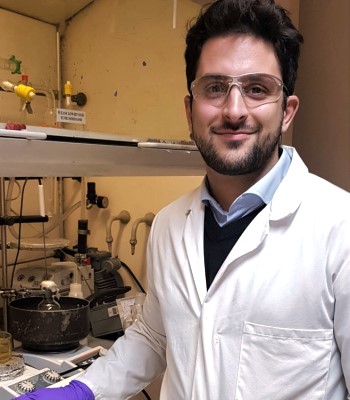Chris Atkins case study

"Scientists have the power to combat climate change and provide future generations with a healthy planet”
Polymer PhD student, Chris, talks about the responsibility of protecting the environment and his contribution to the development of water-based paint for the automotive industry.
I am a polymer chemist. My research is centered around the development of eco-friendly coating formulations for the automotive industry. Traditionally, paints used for cars have been prepared with organic solvents such as toluene or xylene. While efficient, repeated inhalation of these solvents can have adverse effects on human health, and cause harm to the environment. As a result, there has been a big drive in the last decade to develop water-based paints. This is done through the design of polymeric additives that are added to the formulations and allow the pigments to be soluble in water, and this is where I come in.
I am convinced that scientists have the power to combat climate change and provide future generations with a healthy planet. My generation of polymer chemists, I think, will have a big weight on our shoulders. Finding a solution to plastic recycling, reduction of the ozone layer depletion, this will all take time, but I want to do my part.
I was lucky to do my master’s degree at the University of Warwick, and my course leaders often put a strong emphasis on industry-academia partnerships. During the year, I was able to attend several talks by Lubrizol R&D scientists and liked the research themes and general approach to research. My PhD supervisor, Prof. David Haddleton, had a range of different funding available at the time, and I decided to go for the Lubrizol-funded PhD.
A typical day? The first thing I do is to look at recently published scientific articles, they help me keep up to date with the scientific world and sometimes even give me inspiration for my own projects. After that, I will be running analyses on the previous day’s experiments, I usually do this in the morning as I am then able to tweak the experiments, repeat them if necessary and, in the afternoon, think of what the next set of experiments should be.
On a personal level, I believe my PhD has given me the ability to think, to be able to tackle any problems from different angles, and have a rational way of solving them. Otherwise, it has given me the opportunity to travel and visit many different countries for conferences. I was able to create a network of talented people who have actually helped me along the way. As for training, Warwick has some amazing facilities and support personnel that can help you with just about anything you might need, so I have really tried to learn alongside them and train on a wide variety of instruments (e.g. XPS, TEM, GPC, MALDI-TOF etc..)
The people I’ve met during my time with Lubrizol were always genuinely interested in science and always happy to have a discussion. I think my advice to anyone considering this route would be to reach out to potential industrial supervisors, previous PhDs (who could tell you about their experience) as well as PIs at your university that could provide you with valuable advice.
